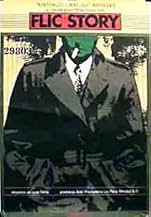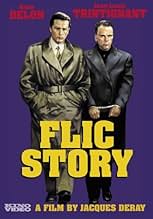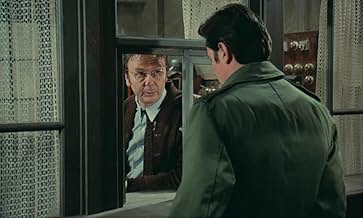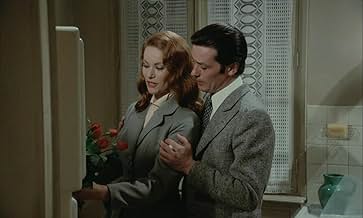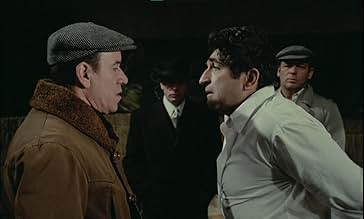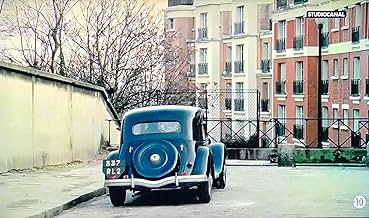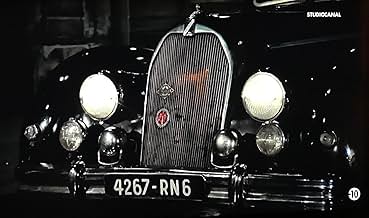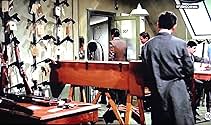Flic Story
- 1975
- 1h 52min
VALUTAZIONE IMDb
6,9/10
3266
LA TUA VALUTAZIONE
La storia della caccia al pericoloso criminale Emile Buisson, scappato di prigione nel 1947.La storia della caccia al pericoloso criminale Emile Buisson, scappato di prigione nel 1947.La storia della caccia al pericoloso criminale Emile Buisson, scappato di prigione nel 1947.
- Regia
- Sceneggiatura
- Star
Recensioni in evidenza
'Flic Story' (1975) is one of the last films in a remarkable series of films 'noir' inspired by the world of French gangsters, made between the 1950s and the 1970s. The master of the genre was Jean-Pierre Melville, whose last film, 'Un flic' from 1972, cast Alain Delon as a crime fighting policeman. Rumor goes that when Jacques Deray undertook the making of this film inspired by a real case and true characters, after having managed to secure the participation of the two actors, he intended to give Delon the role of the gangster and Jean-Louis Trintignant that of the vigilante policeman. It would have been closer to the profiles of the previous roles played by the two, but it would have been a shame. The reversal of roles allows Trintignant to create one of the best performances of his career, and Delon is not bad at all either. The result was a film that Melville would surely have approved of.
Roger Borniche, whose memoirs inspired the film's script, had been a hero during World War II, who had enrolled in the police force because of a personal history. Idealistic, individualistic, unconventional in his choice of working methods, he often comes into conflict with his superiors and his entourage of bureaucratic colleagues, some of whom bear the burden of collaboration during the war. Having reached the position of inspector and with ambitions for advancement, he receives as a mission the capture of Emile Buisson, an escaped and extremely dangerous gangster who flees justice, robs and leaves corpses behind. The mission will not be simple and the pursuit will last many years.
The script is built as an alternation of scenes in which the policeman and the escaped criminal appear, the two meeting only at the end. The duel between Borniche and Buisson in the film translates into an artistic duel between the two great actors, among the most popular and appreciated of their generation. If a winner must be declared, he is Trintignant. They say that the roles of bad guys are easier to interpret. It may be true, but Trintignant's gaze of a killer (sometimes out of pleasure) can still freeze the blood in the veins of viewers. The criminal has one softer side: he loves Edith Piaf's music, and this will play a role in his capture, in an anthological scene. The entire cast is very well chosen and directed, the characters are credible, the milieu of crime and the police methods and stations of the 40s-50s are very authentically reconstructed. The only criticism I would make of the script is that it does not reflect the passage of time. The pursuit lasted for many years and became an obsession for the French media but also for the police, however the events unfold on screen in the almost two hours of cinema without marking the cinematic time. The screenwriters may have relied on the fact that this case was still present in the public memory of France in the 70s, but that is no longer true today. However, this is only a minor detail in an engaging and atmospheric film, which is worth watching or rewatching.
Roger Borniche, whose memoirs inspired the film's script, had been a hero during World War II, who had enrolled in the police force because of a personal history. Idealistic, individualistic, unconventional in his choice of working methods, he often comes into conflict with his superiors and his entourage of bureaucratic colleagues, some of whom bear the burden of collaboration during the war. Having reached the position of inspector and with ambitions for advancement, he receives as a mission the capture of Emile Buisson, an escaped and extremely dangerous gangster who flees justice, robs and leaves corpses behind. The mission will not be simple and the pursuit will last many years.
The script is built as an alternation of scenes in which the policeman and the escaped criminal appear, the two meeting only at the end. The duel between Borniche and Buisson in the film translates into an artistic duel between the two great actors, among the most popular and appreciated of their generation. If a winner must be declared, he is Trintignant. They say that the roles of bad guys are easier to interpret. It may be true, but Trintignant's gaze of a killer (sometimes out of pleasure) can still freeze the blood in the veins of viewers. The criminal has one softer side: he loves Edith Piaf's music, and this will play a role in his capture, in an anthological scene. The entire cast is very well chosen and directed, the characters are credible, the milieu of crime and the police methods and stations of the 40s-50s are very authentically reconstructed. The only criticism I would make of the script is that it does not reflect the passage of time. The pursuit lasted for many years and became an obsession for the French media but also for the police, however the events unfold on screen in the almost two hours of cinema without marking the cinematic time. The screenwriters may have relied on the fact that this case was still present in the public memory of France in the 70s, but that is no longer true today. However, this is only a minor detail in an engaging and atmospheric film, which is worth watching or rewatching.
It so happened for me to watch it at the age of 54.
Had no clue whatsoever about this film.
In my book it is one proof too many that police / crime thrillers are no longer conceived in this fashion.
For the mere reason that film industry is going down the drain.
And it is a pity.
Do yourself a favour and watch it.
Regardless your generation.
Keep the flame of worthy film watching, lit.
Cheers.
Had no clue whatsoever about this film.
In my book it is one proof too many that police / crime thrillers are no longer conceived in this fashion.
For the mere reason that film industry is going down the drain.
And it is a pity.
Do yourself a favour and watch it.
Regardless your generation.
Keep the flame of worthy film watching, lit.
Cheers.
Sitting through this for the first time I was under the delusion it had been directed by Melville, although it didn't seem to be quite his style. Unsurprisingly, it wasn't, but by someone called Deray, whom I'd never heard of. The history of the pursuit, over several years, of a dedicated cop after an unrestrained and ruthless thief and killer, it turns out to be a masterpiece, with depth. Gradually it grows clear that the two men are psychologically related: two sides of one coin. It dawns on the viewer, or it did on this one, that it's to be doubted if there's anything that can be called free will. Both men are creatures of circumstance, who have not really chosen their destinies. There is a curious rapport between them. Cops need robbers, like cowboys need Indians. Each can look on the other and think: there, but for arbitrary fortune, go I. Buisson's use of his gun seems as natural and spontaneous as any of Tarantino's reservoir dogs. Borniche suffers his own harassment and pressures. No man chooses his birth or the pattern of his life. Or does he ? A thought-inducing experience.
The best performances for both Trintignant and Delon, based on a true story dig in the criminal files of the French police. Classical, nothing unexpected but so brilliantly made, pulled by excellent acting and directing. Trintignant told later that he disliked the character he played here, so far from his own sensibility; and that's precisely for this reason that's his performance is awesome. The true definition of a true actor, who can play characters totally different from himself. Don't miss his glance, his terrific and terrifying glance, maybe more terrifying than the real Emile Buisson himself. One of most cold blooded killer that the movie- and not only French - industry has ever shown. Great ending too.
For those who didn't know the criminal history of France : Emile Buisson, born in 1902, started his robbers' life during the 30's, with his older brother. He get married, but his wife and their child died while he was in jail. And after this tragedy, Buisson became a killer. From jailhouses to asylums, Buisson finally escaped in 1947. For three years, almost 20 people were murdered, coldly, brutally shot by Emile. All victims of robberies, or thieves suspected for betraying Buisson. He was the first one in France to be called "P.E.n°1". It's these three years which are counted in "Flic Story". The young inspector Borniche had a lot of work to do in order to arrest Buisson. And he succeeded in 1950. And that wasn't the end. For four years, every crime was studied, dissected. In 1954, Buisson was condemned to die. Twice. On the dawn of February 28th, 1956, in the Santé Prison, M.Obrecht, the executioner, released the guillotine's chopper on Buisson's neck.
But if Borniche hadn't wrote his book, nobody would even remember about Buisson. The book is really good. So is the movie. Trintignant is probably too cute to play Buisson, but he gives a real performance : a real dead cold assassin. You have to like Delon, of course, even if he is great as Borniche ! (I think he is unbearable !) A good police movie !
But if Borniche hadn't wrote his book, nobody would even remember about Buisson. The book is really good. So is the movie. Trintignant is probably too cute to play Buisson, but he gives a real performance : a real dead cold assassin. You have to like Delon, of course, even if he is great as Borniche ! (I think he is unbearable !) A good police movie !
Lo sapevi?
- QuizBased on a true story.
- ConnessioniFeatured in Jinek: Episodio #2.9 (2014)
I più visti
Accedi per valutare e creare un elenco di titoli salvati per ottenere consigli personalizzati
- How long is Flic Story?Powered by Alexa
Dettagli
- Data di uscita
- Paesi di origine
- Lingua
- Celebre anche come
- Cop Story
- Luoghi delle riprese
- 8 Rue Désirée, Paris 20, Parigi, Francia(Buisson hides out at Suzanne's apartment)
- Aziende produttrici
- Vedi altri crediti dell’azienda su IMDbPro
- Tempo di esecuzione1 ora 52 minuti
- Mix di suoni
- Proporzioni
- 1.66 : 1
Contribuisci a questa pagina
Suggerisci una modifica o aggiungi i contenuti mancanti

Divario superiore
By what name was Flic Story (1975) officially released in India in English?
Rispondi
![Bande-annonce [OV]](https://m.media-amazon.com/images/M/MV5BNTg2NDc4MzgtZTFmZi00NTM2LWI4MmYtNjAzZGFiYzE5MmIyXkEyXkFqcGdeQXRyYW5zY29kZS13b3JrZmxvdw@@._V1_QL75_UX500_CR0)
